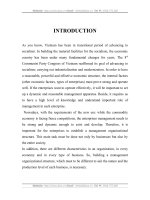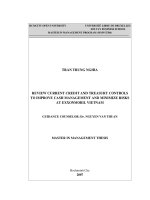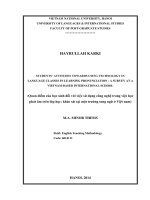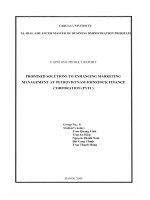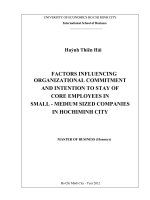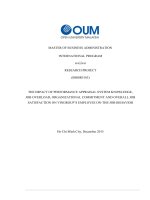Organizational commitment at KIDO (vietnam)
Bạn đang xem bản rút gọn của tài liệu. Xem và tải ngay bản đầy đủ của tài liệu tại đây (1.73 MB, 83 trang )
MASTER OF BUSINESS ADMINISTRATION
INTERNATIONAL PROGRAM
RESEARCH PROJECT
(BMBR5103)
ORGANIZATIONAL COMMITMENT
AT KIDO (VIETNAM)
STUDENT’S FULL NAME
: VO NGOC KHANH PHUONG
STUDENT ID
: CGS00019374
INTAKE
: MARCH 2015
ADVISOR’S NAME & TITLE : DR. KHAI NGUYEN
Ho Chi Minh City, July 2016
ADVISOR’S ASSESSMENT
..…………………………………………………………………………………………………………
..…………………………………………………………………………………………………………
..…………………………………………………………………………………………………………
..…………………………………………………………………………………………………………
..…………………………………………………………………………………………………………
..…………………………………………………………………………………………………………
..…………………………………………………………………………………………………………
..…………………………………………………………………………………………………………
..…………………………………………………………………………………………………………
..…………………………………………………………………………………………………………
..…………………………………………………………………………………………………………
..…………………………………………………………………………………………………………
ADVISOR’S SIGNATURE
..…………………………………………………………………………………………………………
(July 2016)
..…………………………………………………………………………………………………………
..…………………………………………………………………………………………………………
..…………………………………………………………………………………………………………
NGUYEN THE KHAI (DBA)
ACKNOWLEDGMENTS
I would like to express my profound gratitude and deep regards to DR. KHAI
NGUYEN for his supervision, and constant guidance in this report. His guidance
and help will encourage me along this path of live.
Also, I’d like to thank KIDO group and the participants in my survey, who have
willingly shared their precious time during the process of interviewing.
I would like to thank my loved ones, who have supported me throughout entire
process, both by keeping me harmonious and helping me putting pieces together. I
will be grateful forever for your love.
Once again, I thank very much to all.
Vo Ngoc Khanh Phuong Student
CONTENTS
ABSTRACT
1
PART ONE
INTRODUCTION
1
1
About KIDO group
2
Organization structure
13
3
Research problem statement
18
4
Research objective
19
5
Research scope
19
6
Significance of research
20
1
PART TWO
7
LITERATURE REVIEW
Definition of Constructs
8
21
21
Organizational Commitment
21
Supportive and Non-Controlling Supervision
23
Supervisory Support
24
Role Justice
24
Distributive, Procedural, and Interactive Justice
24
Argument for the relationship among the constructs
26
Maslow’s theory
26
Alderfer’s ERG theory
30
Adams’s Equity theory
31
Hackman and Oldham's Job Characteristics
32
Meyer and Allen’s three-component model
34
Albert Bandura’s Social Cognitive theory
37
9
10
PART THREE
11
12
PART FOUR
13
14
15
PART FIVE
Hypotheses
41
Research model
42
METHODS
Data collection
42
42
Design template scale
42
Data collection progress
50
Data analysis
51
RESULTS
Cronbach’s Alpha
52
52
Cronbach’s Alpha standard applied
52
Cronbach’s Alpha of constructs
52
Statistics information
54
Descriptive statistics
54
Correlation statistics
54
Hypotheses testing
55
Hypothesis proposed (H1)
56
Hypothesis proposed (H2)
56
Hypothesis proposed (H3)
57
Hypothesis proposed (H4)
58
CONCLUSIONS
60
16
Discussion
60
17
Limitation of research
61
18
Recommendation
61
REFERENCES
63
63
APPENDIX
Appendix 1: Survey
66
Appendix 2: Presentation
73
FIGURE & TABLE
FIGURE
Figure 1
Maslow's hierarchy of needs
27
Figure 2
Alderfer’s ERG theory
30
Figure 3
Hackman and Oldham's Job Characteristics
33
Figure 4
Research model of Job Satisfaction
42
Table 1
Organizational Commitment Scale
43
Table 2
Supportive and Non-Controlling Supervision Scale
44
Table 3
Supervisory Support Scale
44
Table 4
Role Justice Scale
47
Table 5
Distributive, Procedural, and Interactive Justice Scale
48
Table 6
Time table for data collection progress
51
Table 7
Cronbach’s Alpha - Internal Consistency
52
Table 8
Cronbach’s Alpha of Organizational Commitment
52
Table 9
Cronbach’s Alpha of Supportive and Non-Controlling Supervision
TABLE
53
Table 10
Cronbach’s Alpha of Supervisory Support
53
Table 11
Cronbach’s Alpha of Role Justice
53
Table 12
Cronbach’s Alpha of Distributive, Procedural, and Interactive Justice 53
Table 13
Descriptive statistics
54
Table 14
Correlation statistics
54
Table 15
Model summary of H1
56
Table 16
Coefficients of H1
56
Table 17
Model summary of H2
57
Table 18
Coefficients of H2
57
Table 19
Model summary of H3
57
Table 20
Coefficients of H3
58
Table 21
Model summary of H4
58
Table 22
Coefficients of H4
58
Business Research Methods
P a g e 1 / 77
ABSTRACT
The purpose of this research is to test the relationship between variables in the model
such as Supportive and Non-Controlling Supervision; Supervisory Support; Role
Justice; Distributive, Procedural, and Interactive Justice with Organizational
Commitment. The empirical study result was conducted in KIDO group with 500
employees.
And SPSS software is a tool that is used to analysis data in this research. The collected
data were analyzed through factor analysis, Cronbach’s alpha, descriptive statistics,
correlation, and multiple regression analysis. The research showed that there are four
factors influencing Organizational Commitment are Supportive and Non-Controlling
Supervision; Supervisory Support; Role Justice; Distributive, Procedural, and
Interactive Justice. Moreover, the research provides some recommendations
implications for managers to raise the level of commitment with organization of the
employees. Finally, the research also point out the limitation and future directions in
the same research
Key
word:
Organizational
Commitment;
Supportive
and
Non-Controlling
Supervision, Supervisory Support; Role Justice; Distributive, Procedural, and
Interactive Justice and KIDO group.
Student: Vo Ngoc Khanh Phuong (ID:19374)
111111115838)
Business Research Methods
P a g e 2 / 77
PART ONE: INTRODUCTION
About KIDO group
KIDO CORPORATION at a glance
Head office
138-142 Hai Ba Trung, Dakao Ward, District 1, HCMC,
Vietnam
Founders
The company was founded by Kim Thanh Tran, Le Nguyen
Tran, Buu Linh Vuong, Ngoc Xiem Vuong and Ching Hua
Wang in 1993.
Date of
1993
establishment
Scope of Work
KIDO
Group
Corp
is
engaged
in
production
of
confectionery, purified water, and fruit juice; and processing
agricultural products and foods. It is also engaged in selling
& purchasing agricultural products and foods, industrial
Student: Vo Ngoc Khanh Phuong (ID:19374)
111111115838)
Business Research Methods
P a g e 3 / 77
products, and fabric.
Market capitalization 8,020,476 Tr.VND
Number of
7,741
employees
Stock exchange
HOSE (Ho Chi Minh Stock Exchange, Vietnam)
Kinh Do Corporation (Vietnamese: Công ty Kinh Đô, KDC) (KINHDO:VN,
KDC:VN) is a business group of Vietnam with an emphasis on food production. Main
offices of the company are located in Ho Chi Minh City.
Kinh Do was established in 1993 and has gone through 17 years of formation and
development. Up to now, Kinh Do has become a system of corporations in the field of
foodstuff including: cake, candy, beverage, ice-cream, and products from milk. The
development strategy of Kinh Do is to maintain as one leading foodstuff group in
Vietnam and orient to become a multi-sector group including: foodstuff, real estate,
finance and retail in order to ensure the sustainable development in the future.
From the size of only 70 staffs at the initial establishment, up to now, Kinh Do has
total staff of over 7,741 persons. Products under the Kinh Do trademark are selling in
all provinces through a diversified distribution system nationwide including 524
distributors, 31 Kinh Do Bakery shops and 200,000 retail outlets as well as franchised
distribution systems with a growth rate of 30%/year. The products of Kinh Do have
Student: Vo Ngoc Khanh Phuong (ID:19374)
111111115838)
Business Research Methods
P a g e 4 / 77
been sold to 35 countries; particularly Kinh Do has conquered the most difficult
customers such as Japan, USA, France, Germany and Singapore, etc….
30/06/2015, Having sold 80% of its confectionery business to Mondelez International
for around US$370 million, Kinh Do Corporation (KDC) has changed its name into
KIDO Corporation, effectively abandoning its core confectionery operations.
Shareholders agreed on the company name change but keeping the stock code intact,
KDC. A new chapter of KIDO begun as it transitioned away from the confectionary
business and established the KIDO Group in October 2015 as a Food & Flavor
company.
Scope business
Kido is diversified into
several
fields
of
interest,
listed
along
with
significant subsidiary companies:
Food, primarily confections and soft drinks, are manufactured and distributed
by the following:
Kinh Do Corporation
Binh Duong Kinh Do Corporation
North Kinh Do Food Joint Stock Company
Ki Do Corporation - ice cream and frozen yogurt
Kinh Do Saigon
Vinabico Corporation - confectionary
Finance and investment: Kinh Do Investment Corporation
Real estate: Kinh Do Land
Student: Vo Ngoc Khanh Phuong (ID:19374)
111111115838)
Business Research Methods
P a g e 5 / 77
Vision, Missions Goal and Objective
Vision
More Flavor To Life.
Create life’s flavors through wholesome, healthy, and nutritious products and be the
most recognized company in Vietnam and South East Asia by all stakeholders.
Missions
Consumer misson
Identify and produce affordable food, snacks, beverages and to meet daily needs of
consumers. Our products are pioneering market-leading, healthy, satisfying and
conveniently available to our consumers
Shareholder misson
To allocate capital in order to maximize shareholder value over the long-term and to
manage risk in order to give certainty and confidence that investments in our business
can achieve our shareholder’s goals
People misson
To nurture and develop the skills and capabilities of our people to meet the
professional demands of their work and satisfy their personal needs. In this way we
create a KIDO family that is home to dynamic, creative, and innovative people. KIDO
is the company that can elevate an individual’s ambitions and professional skills,
through a corporate culture based on teamwork and mutual enrichment.
Our Partner Mission
To create sustainable value for supply chain partners through innovative food products
Student: Vo Ngoc Khanh Phuong (ID:19374)
111111115838)
Business Research Methods
P a g e 6 / 77
which address consumer demand trends and exceed consumer expectations. We aim to
provide equitable returns for all and also contribute to improving processes both in
productivity and qualitative output, for sustainable development.
Community misson
To contribute to the communities in which we operate through sponsorship programs
and targeted community development activities. We aim at becoming a leader of
progress for Vietnamese society. Our impact is not only commercial, we also embrace
a social responsibility
Value
KIDo’s values serve as a compass for their actions and describe how they behave in
the world. Their core values are:
Creativeness – Renovation
Dynamic
Being vanguard
Good quality
Being trusty
Setting out a good vision (KINH DO Corporation, 2009)
Student: Vo Ngoc Khanh Phuong (ID:19374)
111111115838)
Business Research Methods
P a g e 7 / 77
Goal and objective
Setting goals and objectives will give a company a target to aim to, therefore all
actions and efforts will be focused on attaining the objective instead of being
inefficiently used and also motivate the leaders and their employees.
As outline in its long-term development strategy, Kido’s goal is becoming one of the
Regional Leading Food Corporation, expanding presence not only in confectionery
production but also the business scopes of high potential and profit generation such as
ice cream, yogurt, milk and dairy products. KiDo set out some objectives that would
need to be fulfilled to achieve the goal. The main objective in 2016 is to maximize
benefits for shareholders, retain the market share and improve competitiveness.
The significance of Stakeholders analysis
Stakeholders can be defined as ‘individuals and groups who are affected by the
activities of an organization. The most important stakeholders can be seen as those
with most to lose from the organization’s actions, but this does not always reflect their
relative power.’. (Tim Hannagan, 2002) In case of KIDO, there are three types of
stakeholder: internal stakeholders, connected stakeholders and external stakeholders.
Each type of stakeholder has its own role and importance in the company. Besides
that, KIDO also influences on each of them variously. It is interacting relationship
between KIDO and its stakeholders.
Internal stakeholders (such as employees and management)
Managers and employees are connected closely with the company. They spend a great
deal of their time and energy for the company and also have the biggest influence on
Student: Vo Ngoc Khanh Phuong (ID:19374)
111111115838)
Business Research Methods
P a g e 8 / 77
it. They are interested in the company’s continuation and growth because it affect
directly to their career and salary.
To meet goal of the company, KIDO has been building a professional, strong staff
which is based on the object of Perfect management, Hi-end effecting.
Managers organize and control businesses of the company. Their role is making
decisions in managing and organizing company’s activities, giving reasonable
recruitment policy, redundancy and retirement policies for employees and so on.
Furthermore, managers give out plans to develop the company and maintain the
performance. They also join in establishing the goal, objectives of the Group. In
KIDO, the managers have created the innovative culture, using cooperative
environment as a support to motivate their employees. They are working to make sure
every employee have a clearly understanding about objectives and every activity are
running forward those.
In every company including KIDO, employees are a company's best asset. 7,741
employees are the main workforce taking strategies into practice, so they have a main
effect on success of the company. Every company wants to make it the second home
where everyone strives to achieve common objectives. With that desire, KIDO Great
Family’s aim is building an ideal working environment which is solidarity, creativity
and pioneering. The responsibilities of every position and every staff is building an
environment of information sharing, harmonious coordination, absolutely completing
goal and quote excellently. KIDO pays attention to assess, identify and encourage
employees in expressing their abilities and strong points in their ways if career
Student: Vo Ngoc Khanh Phuong (ID:19374)
111111115838)
Business Research Methods
P a g e 9 / 77
development and bringing practical effect. Besides that, KIDO also promotes
creativity and encourages innovations to improve performance, develop better policies
to retain employees and attract talent to meet company’s rapid growth and expansion
in the future.
Connected stakeholders (such as shareholders, customers, suppliers and financiers)
Shareholders play an important role in raising capital for organizations and they are
granted special privileges depending on the class of stock, including the right to vote
on matters, the right to propose shareholder resolutions, the right to share in
distributions of the company’s income, the right to purchase new shares issued by the
company and the right to a company’s assets during a liquidation of the company.
Their ownership or potential ownership interest in the company of the members of
KIDO’s Board of Directors, either through share ownership or through holding of
equity based incentives, which may lead to share ownership in the future.
Student: Vo Ngoc Khanh Phuong (ID:19374)
111111115838)
Business Research Methods
P a g e 10 / 77
Suppliers are the ones who provide the material for KIDO to make the product.
Hence, they also influence on the company’s operation. Finding out the suppliers, who
supply a good quality materials and reasonable price is one of the most important thing
for KIDO. The quality of product will depend on quality of material. Furthermore,
prices for material are concerned with cost of production. Thus, in order to have stable
supplying as well as the lowest prices, KIDO always makes long- term relationship
with their suppliers.
Customers are the condition for existing of KIDO. Their wants and needs guide every
action of the company. KIDO Group always wants to serve the best product and
services for the customers by providing products which safe, delicious, nutritional,
convenient, and unique.
Financers provide the capital to the company if the company does not have enough
money to raise the business or take a chance to do business. KIDO has a strong
financial resource hence this kind of stakeholder seems to be less important than
others.
External stakeholders (including the community, government and pressure group)
The Government manages how the company will behaves in all business activities
because the government set up the taxes, the regulation about legal action or
employment rights and builds up the macro strategy to determine the development of
all the country. That will influence to setting a strategy of the company.
The Community is the society in the wide range of issues relevant to the KIDO
business. Nowadays, giving customer cheap price and good quality is enough, every
Student: Vo Ngoc Khanh Phuong (ID:19374)
111111115838)
Business Research Methods
P a g e 11 / 77
company have to take responsibility for the community. The story about Vedan is a
big lesson about that. From the mid-1990s until September 2008, Monosodium
glutamate (MSG) producer Vedan's condiment factory in Dong Nai Province illegally
discharged untreated wastewater into the Thi Vai River through concealed pipes. The
pollution severely damaged local stocks of fish and shrimp. After this truth is
discovered, supermarkets, wholesalers and several other Vietnamese businesses
voluntarily decided to remove monosodium glutamate and other seasoning products
made by Vedan from their shelves to boycott the polluting firm. They said they would
sell the products again after Vedan repair the environmental problem and pay farmers’
damages. That is a big lesson for all companies in Vietnam. Hence, KIDO always tries
their best to reduce maximally their polluted substance to the environment not only to
remain and strengthen the relationship with the community around business area.
Besides that, in KIDO has continued to excel in its corporate social responsibility
when the group emerged as one of the top sponsors of charitable and social events
such as “Helping Students in Flood-hit Areas to Come Back to Their Schools”,
“Dynamic – Students Are Future Entrepreneurs”, “Street of Flowers”. In addition,
KIDO was one of the main sponsors of various major events.
HUMAN RESOURCE POLICIES
Over the last 20 years, human resources has become one of the most important asset of
KIDO. We are a diversified group of people with a broad range of experiences, joined
together with a common goal. Through professional human resources management,
and competitive remuneration policies, KIDO has built up a pool of talented
Student: Vo Ngoc Khanh Phuong (ID:19374)
111111115838)
Business Research Methods
P a g e 12 / 77
employees that share the long-term vision of success with KIDO. This team will be
one of the primary success factors of KIDO in the future.
Human resources management and development policies are founded upon the
philosophy: “If a country’s most precious resources are the people, then an
organization’s most precious resources are the right people”. To develop the human
resources needed for future growth, KIDO has continued to source, nurture and
develop both internal and external talents to transform them collectively into one of
the most competitive teams in the market, becoming an invaluable resources for the
company. This is accomplished through:
Satisfying human resource needs of the company based on long-term strategic
development objectives.
Maximizing human resource potential to achieve optimal efficiency for the
company.
Investing in training and developing talents.
Enhancing employee to employee relationships and building successful teams.
At KIDO, we commit to nurture and develop the skills and abilities of our people to
meet the professional demands of their work and satisfy their personal needs. It value
the capabilities, attitudes, and commitments of our professional staffs. KIDO’s
continuous growth helps to ensure that compensation and bonus packages always
remains attractive to attract the right talent. To attract the best talents is to become the
best company will always be our philosophy.
KIDO HAS BUILT UP A POOL OF TALENTED EMPLOYEES
Student: Vo Ngoc Khanh Phuong (ID:19374)
111111115838)
Business Research Methods
P a g e 13 / 77
Contact
Legal name: KIDO group
Headquarters: No. 138-142 Hai Bà Trưng, P. Đa Kao, Quận 1, TP.HCM
Phone:+84-()08-38.27.08.38
Hotline: 1900 5454 09 - 043.941.0622
Fax:+84-(0)8-38.27.08.39
Email:
Website: www.kinhdofood.com
Organization structure
KiDo is a company with a long history and development. To sustain the future growth
and expansion, we have targeted to operate with a clear corporate governance structure
that facilitates transparency and accountability
Student: Vo Ngoc Khanh Phuong (ID:19374)
111111115838)
Business Research Methods
P a g e 14 / 77
GENERAL MEETING OF SHAREHOLDERS
Propose/ Report
Dismiss
Propose/ Report
Elect/
BOARD OF DIRECTORS
SUPERVISORY BOARD
Audit
Appoint/Dismiss/
Deliberate/Report
INDEPENDENT AUDITOR
Supervise
EXECUTIVE MANAGEMENT
COMMITTEE
Cooperate
Audit
Deliberate/ Report
STRATEGIC BUSINESS
DIRECTORS
Deliberate/ Report
INTERNAL CONTROL
Internal
Delegate/ Execute
CORPORATE
COMPANIES
(BUSINESS UNITS)
Audit
INTERNAL REGULATIONS AND POLICIES
Shareholding (Year 2015)
Student: Vo Ngoc Khanh Phuong (ID:19374)
111111115838)
Business Research Methods
P a g e 15 / 77
% Ownership ( Year 2015)
Type
Shares
% Ownership
% Voting Shares
Local Individuals
90,940,686
35.4%
44%
Local Institutions
64,382,323
25.1%
31%
Foreign Individuals
3,765,495
1.5%
2%
Foreign Institutions
46,572,637
18.1%
23%
Treasury Shares
50,992,256
19.9%
-
256,653,397
100.0%
100.0%
Total
Sales
19.90%
35.40%
Local Individuals
Local Institutions
Foreign Individuals
18.10%
Foreign Institutions
Treasury Shares
1.50%
25.10%
Student: Vo Ngoc Khanh Phuong (ID:19374)
111111115838)
Business Research Methods
P a g e 16 / 77
9,000,000
8,000,000
7,000,000
6,000,000
3,551,745
2,571,543
5,000,000
3,169,294
Non-current assets
4,000,000
3,225,322
Current assets
3,000,000
4,199,762
2,000,000
1,000,000
3,208,952
4,324,132
2,289,383
0
Year Year Year Year
2015 2014 2013 2012
Unit: million
Student: Vo Ngoc Khanh Phuong (ID:19374)
111111115838)
Business Research Methods
P a g e 17 / 77
Unit: million
Year 2015
Year 2014
Year 2013
Year 2012
Net revenue
3,134,104
4,952,663
4,560,598
4,285,797
Profit before tax
6,667,769
662,958
618,618
489,928
Profit after tax
5,253,487
537,124
492,793
357,430
22,280
2,625
3,015
2,611
EPS
Unit: million
Student: Vo Ngoc Khanh Phuong (ID:19374)
111111115838)
Business Research Methods
P a g e 18 / 77
Research problem statement
Along with the development of Vietnam's economy in recent years, the demand for
manpower is increasing. Companies are aggressively developing Human Capital,
especially in the selection of right people for the company. However, recruiting right
people is not enough, we must also know how to keep talent employees, retain talents,
especially how to retain our key staff who plays a key role in the company. With the
shortage of human capital as today, retention good people are becoming big issue of
the companies.
Low turnover and stability of staff will help organizations to save time and costs
(recruitment, training, etc.), reduction of errors (caused by new or unskilled employees
unfamiliar with the new job); create trust and solidarity within the organization. Then
staff will see the organization is an ideal, best place for them to work and demonstrate
their capabilities for long term. More importantly, the stability will help organization
to operate more efficient, produce quality of products and services, build brand
awareness, customer trust and loyalty… In order to build a sustainable workforce for
organizations, many domestic and foreign researched on Organizational Commitment
of employees.
CEO at KIDO group realized Organizational Commitment of employees is important
factor for KIDO group develop sustainably their human resource to help organization
to operate more efficient, produce quality of products and services, build brand
awareness, customer trust and loyalty… But, some factors such as Supportive and
Student: Vo Ngoc Khanh Phuong (ID:19374)
111111115838)
Business Research Methods
P a g e 19 / 77
Non- Controlling Supervision; Supervisory Support; Role Justice; Distributive,
Procedural, and Interractive Justice are problems for human resource management at
KIDO group.
Research objectives
This purpose of this research is way to find the factors influence to the Organizational
Commitment of employees working at KIDO group.
My research will focus 3 main factors:
Firstly: search related information and try to define what meaning
Organizational Commitment is of employees at KIDO group
Secondly: design research model and test related factors to check influence
between factors to access strong / weak level of each factor in influence
progress.
Thirdly:
discussing
and
proposing
recommendation
to
improve
the
effectiveness and forecast the human resources management at KIDO group in
the next time.
Research scope
The scope of research is for the entire employees at KIDO group, includes: General
Director, Vice General Directors, managers, subordinate and employees working at
KIDO group; it does not include: Chairman, Board of Directors, Shareholder,
Supervisory Board, and employees are under probation period or in maturity leave.
The survey scope is within the territory of Vietnam, which includes 500 employees of
KIDO group.
Student: Vo Ngoc Khanh Phuong (ID:19374)
111111115838)
